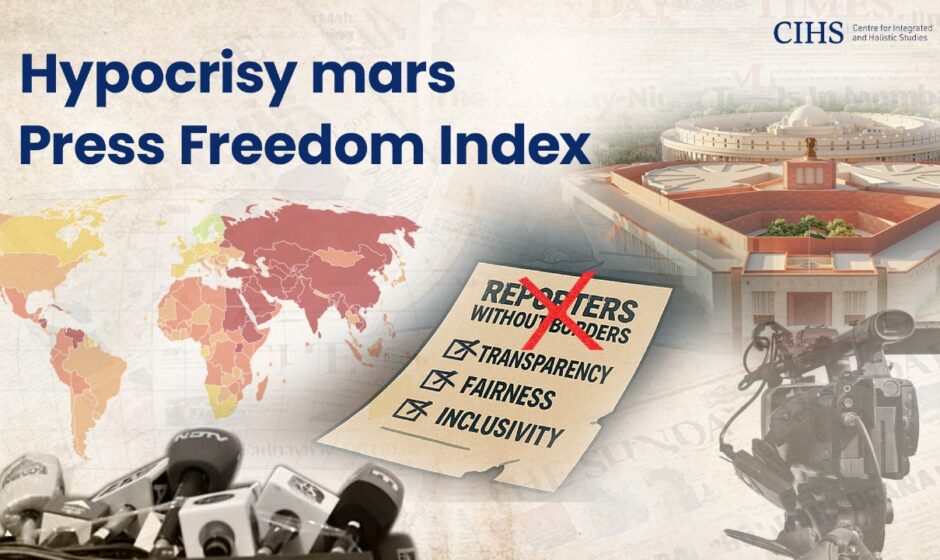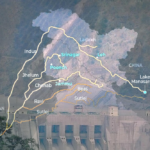Enhanced transparency, fairness, inclusivity and addressing structural issues will make Reporters Without Borders report more credible.
Madhu Hebbar
World Press Freedom Day is observed annually on May 3 by United Nations General Assembly beginning 1993 to champion fundamental role of free press in free democratic societies. It promotes press freedom, evaluates its global state, defends media independence and honours journalists who face persecution or death for their work (United Nations, www.un.org).

In 2025, the focus is impact of artificial intelligence on journalism, addressing both its potential to enhance reporting and its risks, such as misinformation and surveillance. The day calls for governments to protect journalists and encourages media professionals to reflect on ethical challenges, emphasizing the press as cornerstone of democracy.
World Press Freedom Index, published by Reporters Without Borders (RSF), ranks 180 countries based on press freedom across five indicators: political context, legal framework, economic context, socio-cultural context and safety (RSF, rsf.org). In 2024, rankings for United States, United Kingdom, France and India reveal varied challenges, while criticisms of the index’s methodology and perceived biases spark debates about its objectivity.
United States (Rank: 55th, Score: 66.59)
As per the index, US dropped 10 places from 45th in 2023 with press freedom score of 66.59, the lowest in recent years (Statista, www.statista.com). RSF cites growing public distrust in media, fueled by political antagonism, as a key factor. Limited government interference notwithstanding, media ownership concentration, decline of local newsrooms, and layoffs—thousands of journalists lost jobs in 2023–2024—have weakened media landscape (RSF, rsf.org). Biden administration’s rhetoric such as calling journalism “not a crime,” contrasts with its pursuit of WikiLeaks’ Julian Assange and failure to press allies like Israel on press freedom violations (RSF, rsf.org). Critics argue US ranking reflects domestic political polarization rather than overt censorship, yet its mid-tier position highlights structural vulnerabilities in a supposed bastion of free speech (ICIJ, www.icij.org).
United Kingdom (Rank: 23rd, Score: 78.29)
UK improved slightly to 23rd in 2024 from 26th in 2023 with a score of 78.29 reflecting a relatively strong press freedom environment within Europe (RSF, rsf.org). However, challenges persist, including threats to public media funding and legal harassment of journalists through Strategic Lawsuits Against Public Participation (SLAPPs).
UK’s score benefits from a robust legal framework and media pluralism but RSF notes concerns over surveillance laws and detention of Assange which raise questions about government commitment to press freedom (RSF, rsf.org). Critics argue the UK’s high ranking may downplay these issues, especially when compared to lower-ranked nations with more overt censorship, suggesting a possible Western bias in the index’s weightage for subtle versus explicit threats.
France (Rank: 21st, Score: 78.53)
France rose to 21st in 2024 from 24th in 2023, with a score of 78.53, bolstered by strong legislative framework and European Media Freedom Act (EMFA) which protects journalists from political interference (Vajiram & Ravi, vajiramandravi.com). Yet, RSF highlights issues like police violence against journalists during protests and increasing online harassment particularly targeting female reporters.
France ranking reflects Europe’s generally favourable press environment but its score masks domestic challenges such as media ownership concentration and occasional government pressure on public broadcasters (RSF, rsf.org). Critics question whether France’s high ranking overstates its press freedom given these issues compared to lower-ranked nations facing more severe restrictions.
India (Rank: 159th, Score: 31.28)
India improved slightly from 161st in 2023 to 159th in 2024, but its score dropped from 36.62 to 31.28 with gains only in security indicator (Vajiram & Ravi, vajiramandravi.com). RSF reports that nine journalists and one media worker were detained in 2024 and new laws like the Telecommunications Act 2023 and Digital Personal Data Protection Act 2023 grant government sweeping powers to censor media (Drishti IAS, www.drishtiias.com).
Modi government’s ties with media conglomerates such as Reliance, which owns over 70 outlets reaching 800 million people, exacerbate concerns about media independence. India’s government has dismissed the index as “propaganda,” arguing it overlooks democratic vibrancy and uses a flawed methodology with small sample size (Hindustan Times, www.hindustantimes.com). India’s low ranking behind relatively unstable nations like Pakistan (152nd) fuels accusations of bias, as critics claim the index penalizes non-Western democracies disproportionately.
Hypocrisy in Rankings
RSF index faces accusations of hypocrisy, particularly in its treatment of Western versus non-Western nations. US, UK, and France despite domestic issues like media concentration and legal harassment, consistently rank higher than India, where overt censorship and journalist detentions are more prevalent.
Critics argue that RSF’s methodology, reliant on expert questionnaires and Western funding, may prioritize subtle threats in democracies (e.g., distrust in the US) over systemic repression elsewhere (Global Investigative Journalism Network, gijn.org).
For instance, India’s ranking near conflict zones like Palestine (157th) seems harsh to its defenders, given its democratic elections, while the UK’s high ranking despite Assange’s detention raises questions of consistency. RSF’s focus on political indicators, which fell globally by 7.6 points in 2024 may amplify perceptions of bias when Western allies face lighter scrutiny than adversaries like China (172nd) or Russia (162nd) (RSF, rsf.org).
The index’s credibility is further questioned due to its funding from Western governments and NGOs which some argue aligns rankings with geopolitical interests. For example, Qatar (89th) ranks surprisingly high despite media restrictions, possibly reflecting strategic alliances (RSF, rsf.org).
India’s stagnation at 159th despite its democratic framework, suggests a potential Western-centric lens that undervalues non-Western contexts. To address these criticisms, RSF could enhance methodological transparency and diversify its expert pool to better reflect global realities.
Conclusion
World Press Freedom Day underscores vital role of a free press but RSF index’s rankings for US, UK, France and India highlight both unique national challenges and broader questions about the index’s fairness. While US grapples with distrust, UK and France face legal and structural issues and India contends with overt censorship, index’s perceived biases undermine its credibility.
A more transparent and inclusive approach could strengthen its role as a global advocate for press freedom.
(Author is an IIT Graduate Engineer, living in the greater Los Angeles area. He is engaged in coaching youngsters interested in Hindu civilizational history, universal values, and their modern-day relevance.)



